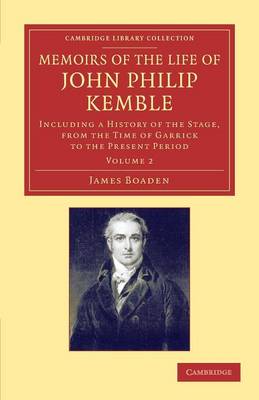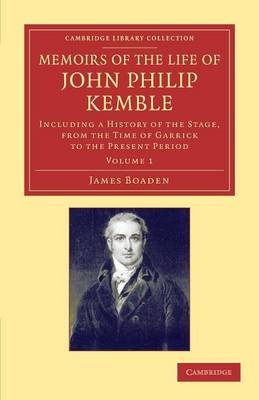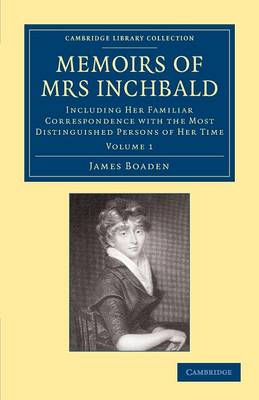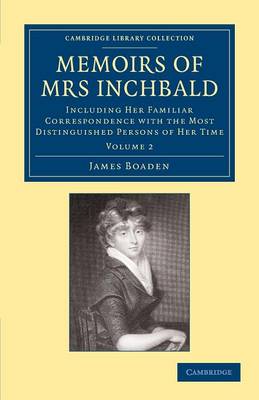Cambridge Library Collection - British & Irish History, 17th & 18th Centuries
6 total works
Memoirs of the Life of John Philip Kemble, Esq.: Volume 2
by James Boaden
Published 5 September 2013
Born into the theatre, though originally intended for Catholic holy orders, John Philip Kemble (1757–1823) made as great a name for himself on the English stage as his gifted older sister, Sarah Siddons. Known for his mastery of tragic Shakespearian roles, among which Coriolanus was deemed his finest, Kemble also distinguished himself as acting manager at Drury Lane under Sheridan. Described by Sir Walter Scott as 'grave, critical, full and laudably accurate', this extensive two-volume biography was the work of James Boaden (1762–1839), an author well acquainted with the foremost theatrical personalities of his day. Boaden's biographies of Sarah Siddons, Elizabeth Inchbald and Dorothy Jordan have also been reissued in this series, along with his edition of David Garrick's correspondence. Volume 2 of the present work opens with the season of 1789–90 at Drury Lane and closes with the text of Kemble's will.
Memoirs of the Life of John Philip Kemble, Esq.: Volume 1
by James Boaden
Published 5 September 2013
Born into the theatre, though originally intended for Catholic holy orders, John Philip Kemble (1757–1823) made as great a name for himself on the English stage as his gifted older sister, Sarah Siddons. Known for his mastery of tragic Shakespearian roles, among which Coriolanus was deemed his finest, Kemble also distinguished himself as acting manager at Drury Lane under Sheridan. Described by Sir Walter Scott as 'grave, critical, full and laudably accurate', this extensive two-volume biography was the work of James Boaden (1762–1839), an author well acquainted with the foremost theatrical personalities of his day. Boaden's biographies of Sarah Siddons, Elizabeth Inchbald and Dorothy Jordan have also been reissued in this series, along with his edition of David Garrick's correspondence. Volume 1 of the present work covers Kemble's career through to his first season in charge at Drury Lane in 1788–9.
Although she overcame a stammer to fulfil her acting ambitions, Elizabeth Simpson (1753-1821), known as Mrs Inchbald after her marriage in 1772, was more acclaimed for her good looks than her performances. Her husband was an actor, and she formed strong friendships with Sarah Siddons and John Philip Kemble, but her greatest impact was as a playwright, novelist, editor and critic. Despite her decision to destroy a four-volume autobiography, her extensive surviving journals and letters allowed James Boaden (1762-1839) to publish this two-volume work in 1833. Having produced biographies of Siddons, Kemble and Dorothy Jordan (which are also reissued in this series), Boaden presents here an informed account of this remarkable woman's personal, theatrical and literary life. Volume 1 covers the period from her birth to 1796 and includes as an appendix The Massacre (1792), a suppressed historical drama about the persecution of Huguenots in 1572.
Although she overcame a stammer to fulfil her acting ambitions, Elizabeth Simpson (1753-1821), known as Mrs Inchbald after her marriage in 1772, was more acclaimed for her good looks than her performances. Her husband was an actor, and she formed strong friendships with Sarah Siddons and John Philip Kemble, but her greatest impact was as a playwright, novelist, editor and critic. Despite her decision to destroy a four-volume autobiography, her extensive surviving journals and letters allowed James Boaden (1762-1839) to publish this two-volume work in 1833. Having produced biographies of Siddons, Kemble and Dorothy Jordan (which are also reissued in this series), Boaden presents here an informed account of this remarkable woman's personal, theatrical and literary life. Including as an appendix The Massacre (1792), a suppressed historical drama, Volume 1 covers the period from her birth to 1796. Volume 2 addresses her final decades and incorporates A Case of Conscience (1800), another previously unpublished play.
Memoirs of the Life of John Philip Kemble, Esq. 2 Volume Set
by James Boaden
Published 5 September 2013
Born into the theatre, though originally intended for Catholic holy orders, John Philip Kemble (1757-1823) made as great a name for himself on the English stage as his gifted older sister, Sarah Siddons. Known for his mastery of tragic Shakespearian roles, among which Coriolanus was deemed his finest, Kemble also distinguished himself as acting manager at Drury Lane under Sheridan. Described by Sir Walter Scott as 'grave, critical, full and laudably accurate', this extensive two-volume biography was the work of James Boaden (1762-1839), an author well acquainted with the foremost theatrical personalities of his day. Boaden's biographies of Sarah Siddons, Elizabeth Inchbald and Dorothy Jordan have also been reissued in this series, along with his edition of David Garrick's correspondence. Volume 1 of the present work covers Kemble's career through to his first season in charge at Drury Lane in 1788-9. Volume 2 closes with the text of Kemble's will.
Although she overcame a stammer to fulfil her acting ambitions, Elizabeth Simpson (1753–1821), known as Mrs Inchbald after her marriage in 1772, was more acclaimed for her good looks than her performances. Her husband was an actor, and she formed strong friendships with Sarah Siddons and John Philip Kemble, but her greatest impact was as a playwright, novelist, editor and critic. Despite her decision to destroy a four-volume autobiography, her extensive surviving journals and letters allowed James Boaden (1762–1839) to publish this two-volume work in 1833. Having produced biographies of Siddons, Kemble and Dorothy Jordan (which are also reissued in this series), Boaden presents here an informed account of this remarkable woman's personal, theatrical and literary life. Volume 2 covers the period from 1796 until her death. It includes as an appendix A Case of Conscience (1800), a play that had not been previously performed or published.




